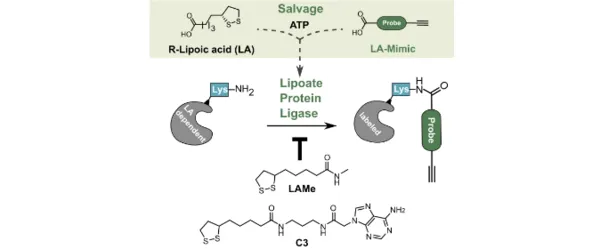New Publication in Angewandte Chemie

The development of novel anti-infectives requires unprecedented strategies targeting pathways which are solely present in pathogens but absent in humans. Following this principle, we developed inhibitors of lipoic acid (LA) salvage, a crucial pathway for the survival of LA auxotrophic bacteria and parasites but non-essential in human cells. An LA-based probe was selectively transferred onto substrate proteins via lipoate protein ligase (LPL) in intact cells, and their binding sites were determined by mass spectrometry. Probe labeling served as a proxy of LPL activity, enabling in-situ screenings for cell-permeable LPL inhibitors. Profiling a focused compound library revealed two substrate analogs (LAMe and C3) as inhibitors, which were further validated by binding studies and co-crystallography. Importantly, LAMe exhibited low toxicity in human cells and achieved killing of Plasmodium falciparum in erythrocytes with an EC50 value of 15 µM, making it the most effective LPL inhibitor reported to date.
Dienemann, J.-N., Chen, S.-Y., Hitzenberger, M.,Sievert, M. L., Hacker, S. M., Prigge, S. T., Zacharias, M. , Groll, M., Sieber, S. A. "A Chemical Proteomic Strategy Reveals Inhibitors of Lipoate Salvage in Bacteria and Parasites", Angew. Chem. Int.
Link: https://onlinelibrary.wiley.com/doi/10.1002/anie.202304533
Copyright: Wiley VCH